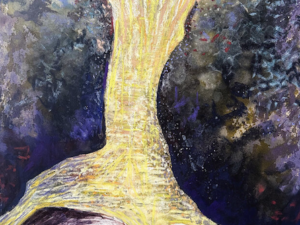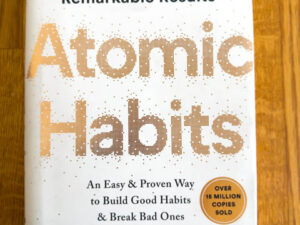I agree with this author’s dismay over the colossal amount of baggage spiritual terminology has. This is especially true for me who wasn’t brought up with it, but was even true for this author who strayed and then returned to it. I love how candid she is about her experience and how much room she encourages us all to give these words.
This is not a new book (1999) and I found it last summer when I was doing a book purge of my office. I had not yet read it but liked previous work by this author. So last July, I started reading this a chapter every couple of days, a pace which I felt contributed largely to my enjoyment of the book.
Kathleen Norris is a poet and as such writes incredibly well. She can cut directly and incisively to the heart of something, and she can also take the long way around spiraling in on her point. This journey with her coming back to the Presbyterian church, via needed nourishment from Benedictine nuns, is soul expanding to read.
Each chapter tackles a word used in faith circles, like redemption, sin, prayer, antichrist, grace, unchurched, chosen, theology, asceticism, pentecostal, trinity, mystic, creeds, blood, repentance, righteousness, annunciation, salvation, detachment, belief, doubt, intolerance, worship, hell, apocalypse, and many more.
Not surprisingly, I loved some chapters, and others did not care that much about. Because of this, it probably reflects more of my unevenness than the author’s, that I give this book four stars. It would be great to read together with a group to discuss the ideas further, and our book group has slated it for February to do just that.
Here are the bits that stood out to me, although these quotes lose a bit of their punch out of context:
- “To say ‘yes’ is to make a leap of faith, to risk oneself in a new and often scary relationship.”
- “I was startled by the words that had come flying out of my mouth; as so often happens when I am put on the spot, I had said things I hadn’t fully realized were true until I’d said them.”
- “Our words are wiser than we are.”
- “What the pastor said was so simple that it will remain with me forever. ‘Each of us acts as the anti-Christ,’ he said, ‘whenever we hear the gospel and do not do it.”
- Silence liberates the imagination. “Silence reminds me to take my soul with me wherever I go.”
- “The Hebrew word for salvation means literally ‘to make wide,’ or to ‘make sufficient.'”
- “Paul makes it clear that if we take inordinate pride in the spiritual gifts we have been blessed with, the joke is on us.”
- “One sixth-century monk, Dorotheus of Gaza, describes detachment as being free from wanting certain things to happen, and remaining so trusting of God that what is happening will be the thing you want and you will be at peace with all.”
- “Conversion is a process; it is not a goal, not a product we consume… Conversion is no more spectacular than learning to love the people we live with and work among. Conversion is seeing ourselves, and the ordinary people in our families, our classrooms, and on the job in a new light.”
- “Addictions and their aftermath take people to the depths of evil…Admitting to addiction often makes people humble, less willing to trust in their self-will alone. And that, the desert monks would say, is half the battle.”
- “Who has not felt the sudden lifting of what had seemed an unbearable burden, the removal of what for too long had been an insurmountable obstacle? Who does not have something deep within that they would not wish to exorcise, so that it no longer casts a shadow on their capacity to receive and give love?”
- “Perfectionism is one of the scariest words I know… The word that has been translated as ‘perfect’ does not mean to set forth an impossible goal, or the perfectionism that would have me strive for it at any cost. It is taken from a Latin word meaning complete, entire, full-grown. To those who originally heard it, the word would convey ‘mature’ rather than what we mean today by ‘perfect… Maturity for one person is different from maturity for another… This sort of perfection demands that we become fully ourselves as God would have us: mature, ripe, full, ready for what befalls us, for whatever is to come.'”
- “Receive a guest with the same attitude you have when you are alone; when alone; maintain alone the same attitude you have in receiving guests.”
- “Prayer is not asking for what you think you want but asking to be changed in ways you can’t imagine.”
- “At its Greek root, ‘to believe’ simply means ‘to give one’s heart to.’ Thus, if we can determine what it is we give our heart to, then we will know what it is we believe.”
- “I had thought my doubts were spectacular obstacles to my faith and was confused but intrigued when an old monk blithely stated that doubt is merely the seed of faith, a sign that faith is alive and ready to grow.”
- “It took me a long time to recognize that the desire to worship is in itself a significant form of belief.”
- “ambivalence is a sacred emotion.”
- “When the mystery of God’s love breaks through into my consciousness, do I run from it?… Or am I virgin enough to respond from my deepest, truest self, and say something new, a ‘yes’ that will change me forever?”
- Jung knew that what we reject as ‘nothing’ always gets us in the end.”
- “Idolatry makes love impossible.”
- “Unfortunately it is scorn for others that often marks religion’s public face in America.”
- “Righteous: at its root in Hebrew, the words means ‘one whose aim is true,'”
- “Hope may be a kind of name for God.”
- “God is identified through relationship. One that demands great willingness to trust and to take risks.”
- “Thomas Aquinas said that God was active, always in motion– an ocean of being, the sun lighting up the atmosphere; not a noun, but a verb. The-God-Who-Is,’
- “I have come to think of Mary as the patron saint of ‘both/and’ passion over ‘either/or’ reasoning… as simultaneously Virgin and Mother.”
- “I wonder if holiness is not the ability to apply one’s anger in quietly working against systemic evil, taking care not to draw undue attention to oneself.”
- “When it is absolutely necessary to correct another, do so, they said. But do it quickly and simply, then let it go. Don’t get entangled in the expectation of results.”
- “Much if not most intolerance is at base a stupefying ignorance rather than a deeply rooted conviction.”
- “Jesus Christ asks us to interpret ourselves, and each other, with the same hospitable, good-hearted diligence that we grant to him. He offers the truth not as a thing but as a way, an opening on the path between the spirit and the letter of the law– a way of forbearance.”
- “It seems to me that if you can’t ever admit to being a wretch, you haven’t been paying attention.”
- “Faith is best thought of as a verb, not a ‘thing’ that either you have or you don’t.”
- “Faith is not synonymous with certainty but is the decision to keep your eyes open.”
- “Faith then is fragile, something that needs tending.”
- “Church is about community loving their neighbor as themselves. You go because someone may need you there.”
- “Worship itself might in fact be a living poem.”
- “When God-talk is speech that is not of this world, it is a false language.”
- “Political power seems to corrupt religions, corroding them from within.”
- “I often think that if I’m a Christian, I’ll be the last to know.”
- The Rule of St. Benedict states that “all guests who present themselves are to be welcomed as Christ. Benedict knew that hospitality could be life-saving for both monk and guest. He instructs Benedictines not to turn their backs on the world, even as they seek to detach themselves from worldly values. To reject the world is to reject other people, and to reject other people is to reject Christ himself.”
- “Mary knows that no small part of welcoming a guest is the ability to settle down and listen.”
- “No woman gives birth to an enemy face.”
- “The story of Jacob says to me that if we’ve ever truly been forgiven, we have seen the face of God. If we’ve ever been on the receiving end of an act of mercy that made a difference in our lives, we have seen the face of God.”
- “People who have endured the pain of exile and enslavement are likely to take refuge in the thought that there is punishment for their tormentors, if not in this world then in the next.”
- “The word ‘apocalypse’ comes from the Greek for ‘uncovering’ or ‘revealing,’ which makes it a word of possibilities.”
- “When people speak in the same tone of voice about a ‘personal deodorant,’ a ‘personal trainer.’ and a ‘personal Savior,’ I suspect what they really mean is private. (I’ve got mine; too bad about you.) but Christianity, like its ancestor Judaism, is inescapably communal.”
- “Dogma is not dogmatic dogmatism. The Greek root from which dogma comes means “what seems good, fitting, and becoming.'”
- “The reality of human sin is admitted, but the sin of casting judgement is seen as the worst of all.”
- Albert Einstein: “If we trace out what we behold and experience through the language of logic, we are doing science; if we show it in forms whose interrelationships are not accessible to our conscious thought but are instinctively recognized as meaningful, we are doing art. Common to both is the devotion to something beyond the personal, removed from the arbitrary.”
- “Prayer is not doing, but being.”
I’d recommend reading Amazing Grace to anyone who wants to probe Christian vocabulary a little further in the hands of an unabashed, fearlessly direct, open minded, and remarkably cogent writer.
1 Comment
Pingbacks
-
[…] 2. Amazing Grace: Toward a Vocabulary of Faith (4 star review here) […]










